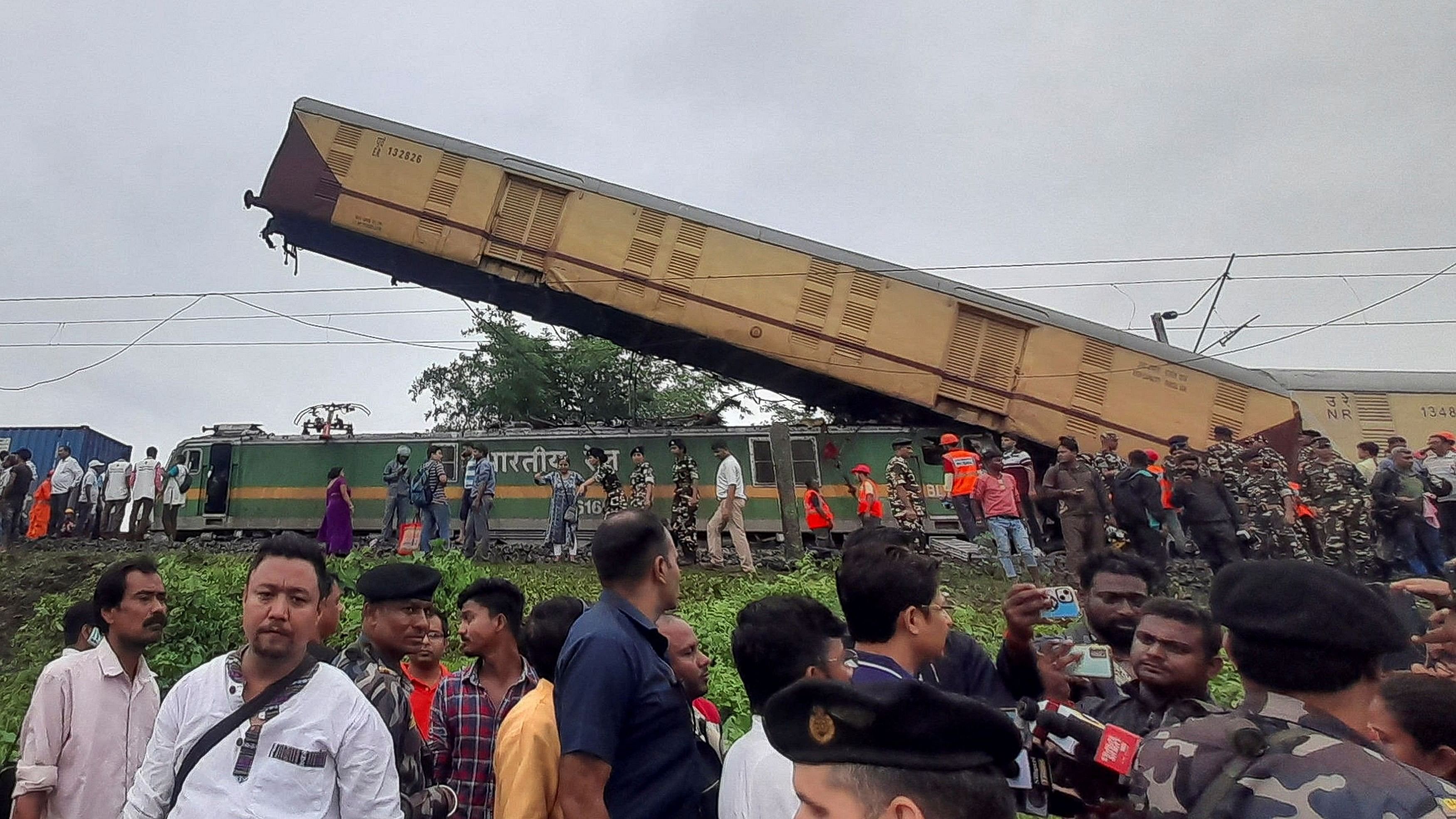
Rescue workers along with people gather at the site of a train collision after the accident in Darjeeling district in West Bengal state.
Credit: Reuters Photo
Kolkata: A freight train rammed into a passenger train in the Darjeeling district of West Bengal on Monday, killing at least nine people and injuring over 40 others.
The 13174 Kanchanjunga Express, which was on its way from Agartala in Tripura to Sealdah in West Bengal, crossed Rangapani Station, nearly 30 kilometers away from New Jalpaiguri Station, at 8:27 a.m. and stopped between Ranipatra and Chhatar stations. A freight train then crossed the Rangapani Station at 8:42 a.m. and hit the rear end of the Kanchanjunga Express at around 8:55 a.m. – resulting in the derailment of the four rear coaches of the passenger train – the guard’s coach, a general seating coach, and two parcel coaches.
The collision killed at least nine people, including the pilot of the goods train and the guard of the passenger train, according to officials of the West Bengal government. The mortal remains of the deceased were extricated from the derailed coaches of the passenger train. The injured were rushed to the North Bengal Medical College and Hospital in Jalpaiguri.
Prime Minister Narendra Modi called the mishap ‘saddening’ and conveyed condolences to the families of the deceased. “I pray that the injured recover at the earliest. Spoke to officials and took stock of the situation. Rescue operations are underway to assist the affected,” he wrote on X. Railway Minister Ashwini Vaishnaw visited the scene and oversaw the rescue operation, which was completed by late afternoon.
“The accident will be thoroughly investigated by the Commissioner of Railway Safety,” said Vaishnaw, who rode on the pillion of the motorcycle of a local man to reach the site of the accident. He said that enhanced ex-gratia compensation would be provided to the victims, at the rate of Rs 10 Lakh for the family of each deceased, Rs 5 Lakh for each grievously injured, and Rs 50,000 for each passenger who suffered minor injuries. He also visited the hospital and enquired about the injured. “We will identify the reason behind this accident and take proper preventive measures in the future,” said the minister.
Railway Minister Ashwini Vaishnaw reached the spot riding pillion on a motorbike for some distance as the road was narrow for bigger vehicles to move. He took stock of relief operations and announced compensation for the injured and kin of the deceased.
While Rs 10 lakh would be given to the next of kin of the deceased, Rs 2.5 lakh would be provided to the grievously injured and Rs 50,000 to those with minor injuries, Vaishnaw posted on X.
Vaishnaw said the Commissioner of Railway Safety (CRS) has started a probe into the cause of the accident and added that measures will be taken to prevent a recurrence of the circumstances that led to the accident.
He stressed that restoring train operations on the critical route connecting northeast India with the rest of the country is a top priority for the railways.
Jaya Varma Sinha, chairman of the Railway Board, said that the accident prima facie happened due to human error and disregard of signal.
“I was at home preparing for celebrating Eid-ul-Adha. I heard a loud bang suddenly and rushed to the rail line to find the coaches of the Kanchanjunga Express derailed with many passengers crying for help,” Fazlur Rahman, who lives in a village near the scene, said. He and other villagers immediately started rescuing the injured passengers from the derailed coaches and sent them to the hospital by ambulances. “A passenger was writhing in pain and crying for help, but died before we could bring him out.”
“The train was moving very slowly. We suddenly felt a sudden jerk and the train came to a halt,” Suman De, who, along with his ailing father, boarded the Kanchanjunga Express in Agartala, said. “I looked out and saw the rear coaches mangled and derailed,” said De, who was on his way to Sealdah for his father’s treatment in a hospital in Kolkata.
The automatic signalling system between Ranipatra Railway Station and Chattar Hat Junction in West Bengal was not working. The station master of the Ranipatra Railway Station issued a written authority to the driver of the Kanchanjunga Express. The written authority allowed the train to cross the defective signals at a speed of not more than 10 km per hour with a one-minute halt at each defective signal.
Sanjay Pandhi, the working president of the Indian Railway Loco Runningmen Organisation (IRLRO), said that the goods train’s driver, who died in the mishap, should not be accused of disregarding signals before the investigation by the Commissioner of Railway Safety.
The villagers, who rescued the injured passengers, said that the Kanchanjunga Express was moving slowly when it was hit by the goods train that was moving faster.
